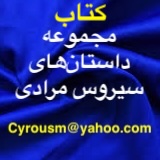Link
MajidNaficy 's Recent Links
The New Yorker: Elizabeth Gilbert’s Latest Epiphanies
MajidNaficy | 16 hours ago
0 26
The New Yorker: The Mysterious Cover Artist Who Captured the Decline of the Rich
MajidNaficy | 16 hours ago
0 26
The New Yorker: Do State Referendums on Abortion Work?
MajidNaficy | 16 hours ago
0 22
Iranian Canadian MP Goldie Ghamari TORCHES Hamas & Iran’s Regime in Parliament
Viroon | 11 hours ago
0 67
Category: None
'Freedom for Iran' protester on top of King's Cross station holding dog
Viroon | 11 hours ago
0 55
Category: None










Comments